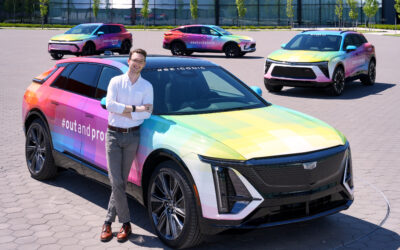July 11, 2025 |
GEL Experience Drives Alum’s Success
Developing new technologies that improve people’s lives is what motivates Evan Hostetler most as an automotive engineer. So, it’s no surprise that he is currently working on the next-generation Chevy Bolt, which promises to make electric cars more accessible to more people.
“Electrification is where the investment and new developments are now,” said Evan ’22 (Course 2-A). “I enjoy the challenge of trying to do more with a technology, push the boundaries in some way. The Chevy Bolt might not be the highest performing electric car, but the goal is for it to be one of the most affordable for people.”
As a kid, Evan never dreamed he would be working on electric cars, but he sure dreamed of being in the auto industry.
“I’m a lifelong car lover. I’ve been reading car magazines since I was eight years old. I grew up around cars, worked at a mechanic shop in high school, and always intended to be in the auto world. It’s really cool to be someone now influencing new vehicles coming to market.”
His road to General Motors began when he landed an internship in Detroit as a sophomore. For a mechanical engineering major with a concentration in product design – and a passion for all things cars – it was a natural fit. GM hired him full time after graduation.
His first engineering role was developing components for seats (“incredibly complicated engineering, because of all the safety and durability and comfort aspects”) before moving to Assistant Program Engineering Manager on the Chevy Bolt program.
“I work with vehicle systems engineers who represent different areas of the vehicle – interior, exterior, chassis, battery, motors, etc. We work closely together to optimize the design and make design tradeoffs for profitability or performance. I also interact with other functions in the company such as purchasing, quality, and manufacturing.”
He credits his GEL1 and GEL2 experiences with giving him the capabilities and confidence to excel in those settings, something many of his peers lack.
“My GEL experience is one of the most valuable and stickiest experiences of my undergrad. Engineering is such a team sport. If you’re developing any product or service, you do not do that in a room with your door shut. You have to be able to work on teams and build those relationships to execute really hard engineering problems.”
Evan says the GEL program taught him how to be a better engineering leader – how to ask questions, negotiate, make tradeoffs, influence people, align and execute, and know when to lead and not to lead. The Engineering Leadership Labs gave him the opportunity to practice those skills.
“The labs taught me how to quickly evaluate situations, do up-front analysis, take the core information I needed, and have healthy tension and debate with other engineers coming from different perspectives.”
As a GEL 2, he further developed team-leadership skills that he uses on the job now. “I was tasked with building a team, deciding who would be the functional leaders, and creating a culture of excellence where everyone is contributing. I’m just starting to see the need for those skills pop into my career.”
It doesn’t hurt that many of the capabilities he learned as a GEL student are highly valued by GM.
“They have behavior guides for their employees that mirror the behaviors practiced in the GEL program. Essentially, GEL’s effective engineering capabilities are part of employee performance at GM. There’s a mutual understanding that this is what it takes to succeed.”
Evan makes a point of giving back to the program that helped launch his career. He returns to GEL annually to facilitate a class session on vehicle architecture decision-making in the 16.810 Engineering Design & Rapid Prototyping class. And you might find him at an ELL giving an industry perspective to current GELs.
He says his goal is to continue working on products that add value to people’s lives. If he were to apply the product design framework to his career, he would be “at the end of the concept specification stage. I’ve accumulated a number of experiences that inform future direction, set some hard points around non negotiables for the type of work I like to do, but I am still very open to the particular details of what that looks like and how it develops.”


